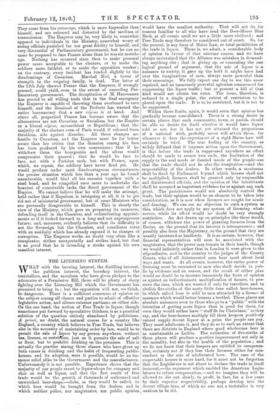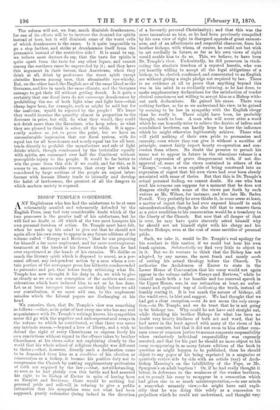THE LICENSING SYSTEM.
WHAT with the brewing interest, the distilling interest, the publican interest, the beershop interest, the teetotallers, and the members who have given pledges to the advocates of a Permissive Bill, there will be plenty of sharp fighting over the Licensing Bill which the Government has promised to bring in ; but the opposition will not, we think, be dangerous. There is a sufficient consensus of opinion on the subject among all classes and parties to admit of effective legislative action, and silence extreme partizans on either side. On the one hand, the notion of Free Trade in liquor, though sometimes put forward by speculative thinkers, is as a practical solution of the question entirely abandoned by politicians. A priori, no doubt, the natural course for a country like England, a country which believes in Free Trade, but believes also in the necessity of maintaining order by law, would be to permit the sale of liquor by any person anywhere, without tax, licence, or restriaion, just as it permits the sale of salt or flour, but to prohibit drinking on the premises. This is actually the practice among those classes who have given up both excess in drinking and the habit of frequenting public- houses, and its adoption, were it possible, would be an im- mense relief alike to the Government and the manufacturers. Unfortunately it is not possible. Experience shows that the majority of our people resort to liquor-shops for company and chat as well as liquor, and that the first result of free trade would be the growth of thousands of unlicensed and tmwatched beer-shops,--clubs, as they would be called, to which beer would be brought from the dealers, and in which neither police, nor magistrates, nor public opinion
would have the smallest authority. That will not do, for reasons familiar to all who have read the Beer-House Blue Book, at all events until we are a little more civilized ; and Free Trade may therefore be considered out of court. So, for the present, is any form of Maine Law, or total prohibition of the trade in liquor. There is, we admit, a considerable body of opinion in favour of that extreme course, and we have always maintained that the Alliance was mistaken in demand- ing anything else ; that in giving up or concealing the one‘ logical ground of argument, that the sale of liquor is a nuisance to society, it gave up the hold it might have had over the imaginations of men, always more powerful than their reasonings. We fully expect one day to see this error repaired, and an immensely powerful agitation commenced for suppressing the liquor traffic ; but at present a bill of that kind would not obtain ten votes. The issue, therefore, is reduced to a single point, the extent of restriction to be placed upon the trade. It is to be restricted, but it is not to be suppressed.
Within these limits, again, it would seem that opinion has gradually become consolidated. There is a strong desire in certain places that each community, town, or parish, should be able to decide for itself whether it would have liquor sold or not, but it has not yet attained the proportions of a national wish, probably never will attain them, for whenever it does the experiment of a rigid Maine Law will certainly be tried. The true feeling of the country, so widely diffused that it imposes action upon the Government, is that before the trade is suppressed anywhere an effort should be made to secure two ends, the limitation of the supply to the real needs or fancied needs of the people—so that the trade should not be also the temptation—and the respectability of the dealers. In other words, a maximum shall be fixed by Parliament b:Tond which houses shall not be multiplied, licences shall be granted only by responsible and disinterested officials, and the opinion of the inhabitants shall be accepted as important evidence for or against any such grant. Tile parishioners would not absolutely control the trade, but their opinion would be an element to be taken into consideration, as it is now when licences are sought for music and dancing. We can see no objection to such a system as this, which does not apply to any system of licensing what- soever, while its effect would no doubt be very strongly restrictive. An Act drawn up on principles like these would, of course, withdraw the power of granting licences from the Excise, on the ground that its interest is intemperance ; and possibly also from the Magistracy, on the ground that they are usually interested as landlords. It is so certain, however, that financial representatives will soon be associated with the magistrates, that the power may remain in their hands, though we would infinitely rather that in London it were given to the stipendiaries, and in the country to the judges of the County Courts, whp of all disinterested men hear most about local ways and wants. At all events, however, the entire power of licensing must be entrusted to men who shall decide in pub- lic by evidence and on reason, and the result of either plan would no doubt be to increase immensely the force of opinion as against an indiscriminate multiplication of houses, to pre- serve the inns, which are wanted if only for travellers, and to abolish five-sixths of the nasty little dens called beer-houses, in which salted beer is sold to men attracted by a licence of manners which would better beseem a brothel. These places are absolute nuisances even to those who go to a "public" with the intention of getting more liquor than is good for them, for even they would rather have " stuff fit for Christians," as they say, and the beer-houses multiply till their keepers positively cannot supply decent liquor at a price the people can pay. They must adulterate it, and they do so to such an extent that there are districts in England where good wholesome beer is as unattainable as Lafitte. The extinction of five-sixths of these places will produce a positive improvement not only in the morality, but also in the health of the population ; and we do not know that their keepers are entitled to compensa- tion, certainly not if they lose their licences either for mis- conduct or the sale of adulterated beer. The case of the respectable houses is more hard, for it must not be forgotten that the Legislature is not about to declare the trade in itself immoral,—the argument which enabled the American Legis- latures to refuse compensation,—and we imagine they will be allowed to die out slowly, to profit, in fact, for a few years by their superior respectability, perhaps develop into the decent village inns, of which no one not a teetotaller is very anxious to be rid.
The reform will not, we fear, much diminish drunkenness, for one of its effects will be to increase the demand for spirits instead of beer, but it will diminish some of the worst evils of which drunkenness is the cause. Is it quite impossible to go a step farther, and strike at drunkenness itself from the persuasive instead of the restrictive side ? It is usual to say, we believe most doctors do say, that the taste for spirits is quite apart from the taste for any other liquor, and cannot among the northern races be superseded by it ; and they have this argument in their favour, that Americans, when they drink at all, drink by preference the worst spirit except absinthe known among men, that abominable rye-whisky. But, on the other hand, the English are of the same blood as the Germans, and live in much the same climate, and the Germans manage to get their fill without getting drunk. Is it quite a certainty that our fiscal laws do not encourage drunkenness by prohibiting the use of both light wine and light beer—that cheap lager beer, for example, such as might be sold but for the malt-tax, would be rejected by the people ? We know they would increase the quantity almost in proportion to the decrease in price, but still, do what they would, they could not drink more than the Bavarians, who keep sober, or what they are pleased to think is sober, all the while. It is appa- rently useless as yet to press the point, but we have an uncomfortable impression that our fiscal system, with its equal tax for all beer-houses and nearly equal tax for all beer, tends directly to prohibit the manufacture and sale of light drinks which, though condemned by the teetotaller equally with spirits, are consumed over half the Continent without perceptible injury to the people. It would be far better to win the game from this side if we could, and for this, as it seems to us, unanswerable reason, that every law which is considered by large sections of the people an unjust inter- ference with human liberty tends to intensify and develop the habit of lawlessness, the greatest of all the dangers to which modern society is exposed.



































 Previous page
Previous page